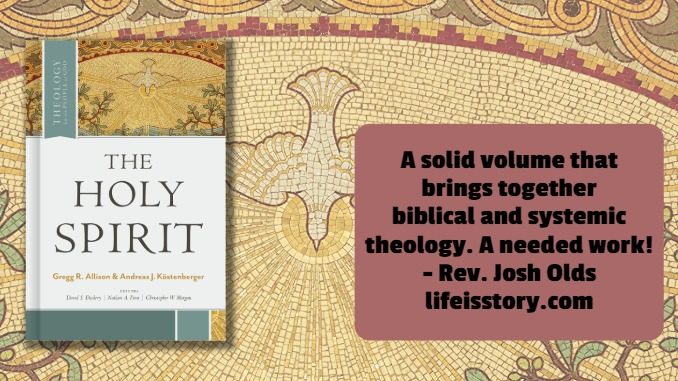
Published by B&H Academic on June 1, 2020
Genres: Academic
Buy on Amazon
Goodreads

This book studies the Holy Spirit through the lens of both biblical and systematic theology. It provides a comprehensive look at the third person of the Trinity as revealed by Scripture, focusing on eight central themes and assumptions.
The topic of the Holy Spirit can often be overwhelming. Churches and denominational traditions seem to either place the Spirit in a place of great prominence or very nearly downplay the Spirit into nonexistence, at least in terms of personhood. Churches and pastors struggle to clarify the work and the personhood of the Spirit to their congregations, so much so that a Barna poll once found that 58% of respondents agreed that the Holy Spirit is “a symbol of God’s power or presence but is not a living entity.”
Debate about the Holy Spirit’s work and role has always been a contentious part of Christianity, going as far back as the East-West schism in 1054, where one of the reasons for break in the Church was the function of the Holy Spirit. In modern times, particularly in the Baptist tradition, my personal experience is that there is very little ever said about the Spirit—except maybe in condemnation or derision of Pentecostal or Charismatic groups for whom revelation and empowerment through the Spirit is quite important.
The Holy Spirit by Gregg Allison and Andreas Kostenberger seeks to remedy that, providing readers with a thorough biblical and systematic theology of the Spirit through a Baptist lens. Indeed, the very premise of the series—Theology for the People of God—is intended to provide an “advanced layperson” overview of core Christian doctrines. By beginning the series with a discussion of the Holy Spirit, the editorial team shows their thoughts on how needed and crucial a book like this is.
Biblical Theology | Written by Andreas Kostenberger
Biblical theology is a notoriously tricky term to define, as different theologians have used it to mean different things. Kostenberger seems to best follow D.A. Carson’s definition:
Biblical theology . . . seeks to uncover and articulate the unity of all the biblical texts taken together, resorting primarily to the categories of those texts themselves.
This section of the book goes straight through the Scriptural canon and pinpoints every instance the Holy Spirit is alluded to or mentioned with some commentary. This effort to compile and contextualize every reference to the Spirit is a very useful tool for scholars and pastors alike, particularly in the OT canon. Though I must admit, I would have liked to have seen a more robust discussion of the nature of the Holy Spirit throughout the Old Testament, as well as grappling with how Judaism has interpreted these Holy Spirit passages.
Systematic Theology | Written by Gregg Allison
After the section on biblical theology, Kostenberger hands off the book to Allison to basically overlay a theology of the Holy Spirit upon the traditional structures of systematic theology. For example, ecclesiology is that study of the church, so how does the Holy Spirit influence the church? Eschatology is the study of last things, so how does the Holy Spirit influence the final judgment?
Even though it’s a small section, I particularly appreciated the framework of three ages that Allison develops. In this, they make a distinction between the “spirit of the age” (the era and context in which we live), the “age of the Spirit” (the current time between Christ’s first and second comings), and the “spiritual age” (denoting the current secular interest in spirituality)
The Holy Spirit also spends a lot of time developing arguments for the deity and personhood of the Spirit, which is much-needed in current lay-level theology and pastoral settings. The two authors very clearly and thoroughly lay down the biblical and historical tradition, as well as the logical necessity of the Spirit’s deity and personhood.
Allison also dives into issues regarding the Trinity, particularly intratrinitarian relations. This is a heady topic always and, while Allison employs diagrams to explain, I’ll be honest and say that it only helps a little. (Norman Geisler’s section on the Holy Spirit and the Trinity in his Systematic Theology remains the clearest discussion of this topic that I’ve read.) It’s an overwhelming topic and while Allison parses it correctly and explain it cogently, it’s still perhaps a bit more complex to work through than the rest of the text.
Overall | The Holy Spirit
Overall, this is a solid volume that I see being used in a lot of undergraduate level courses and lining the shelves in a lot of pastor’s offices. It’s a useful tool and compiles a lot of information that before I’d have to consult any number of books to get. It’s an astounding reference work and the connection of biblical and systematic theologies surrounding one topic is a unique concept. I’m looking forward to seeing what other volumes this series will produce!
